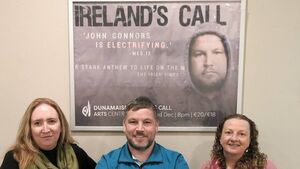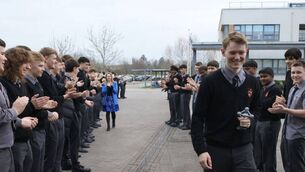Connors to give final last ever performance of one-man play in Laois

Actor John Connors with the new CEO of the Dunamaise Arts Centre Ciara O' Connell (left) and her predecessor Michelle de Forge (right) underneath John's poster Photos: Stan Henderson
LAOIS theatre-lovers are in for a treat when renowned Irish actor, screenwriter, director, filmmaker and playwright John Connors brings his powerful one-man-play to the Dunamaise Arts Centre on Tuesday 2 December.
The Laois performance of his 2018 show is to be his last ever performance of his acclaimed monodrama which he toured the world with.
is described as “A Stark Anthem to Life on the Margins” by , and simply said: “John Connors is Electrifying!” The talented actor is well-known for his role as Patrick Ward in and has starred in a wealth of Irish movies including and to name a few.
John’s performance is sure to be a stellar and memorable theatrical treat for theatregoers. Following the 55-minute performance, John will engage a post-show discussion with the Laois audience in a questions and answers session.
The busy actor took time from his schedule to visit the Dunamaise Arts Centre to speak with the about his acting career and his upcoming grand finale performance Speaking about his younger years, John said: “I’m from Darndale in Coolock and I dropped out of school at 15 even though I was doing well. I thought it was the manly thing to do and go to FÁS to do a metalwork course. During the metalwork course two acting teachers came in and I did a six-week course with them. On the last week my old metalwork tutor got jealous of my participation in the acting course, and he publicly humiliated me. I left FÁS that day. That was my first experience of acting.
“The next day I started getting involved in crimes, day-to-day 15 and 16-year-old blaggarding, messing, and bare-knuckle fighting all around until my mother found out. She asked me to stop so I stopped. I went down a dark path of depression for almost a year-and-a-half and almost eat myself to death while watching and going to the cinema with my dole money. I was buying DVDs, and I got really low. One day I nearly said ‘God I’m going to kill myself!’ and within that moment my brother knocked on the door. He asked if I was going to kill myself. I said no but gave him an indication that I was. He said I couldn’t do that because ‘we can’t afford to bury you!’ “He advised me to try acting again and said that people were saying I was good and could tell a story or two. So, I joined an acting class in the Abbey School of Drama. I nearly choked an actor who was being racist in a scene with somebody else and it turned into an altercation. I left the classroom because I thought they were going to get me arrested even though I was in character. The teacher told me to come back but not to touch anyone again. I really found acting and creativity from there.” John said that when he decided to do something positive with his life and change his mentality that positive things started happening.
He said: “I got a lead role in a film called , another lead role in , which I co-wrote with writer and director Mark O’Connor. This was Barry Keoghan’s first starring role; Mark and I wrote that role for him. Then came along, and I wrote and starred in . These kind of films and TV shows became very popular in Ireland. This allowed me to build a bit of a platform for myself. I then started doing a lot of documentaries which I love and started to direct.
“I directed and that got an American cinema release in 2024. It’s about intergenerational trauma deriving from clerical abuse. I’ve just finished my second film called which is about TUSLA and how they have circularly reneged on their promise of 1916.” John said that as soon as he found the arts things turned from dark to light but that it didn’t fix him completely, but he used creativity as a bandage rather than a healer. He said that the real healer is God.
John said: “Ultimately the healer is God. I probably found that out in the last couple of years. Now I have a podcast called Reclaim the Faith and it’s about exactly what it says on the tin – reclaiming the faith.” Speaking about , John said: “Back in 2018 I wasn’t in a great place, but I knew I wanted to get back on stage. I pitched the idea of what became to the Irish Film Institute, Fishamble and The Dublin Fringe for a programme called Show in a Bag. They wanted a show that you could put in a bag and go on tour with and ***Ireland’s Call*** had its world premiere at the Dublin Fringe.
“It’s about a young working-class man from Coolock whose name is James who was reared by his grandmother since birth. He had a lot of traumas in his life and grew up without a mother and father. Through his story we see the working-class struggle of the last 50 years in Ireland and how they have been neglected. It’s about intergenerational trauma, addiction, republicanism, and classism which some people don’t like to talk about.
“There’s a lot of laughs along the way. The first 20 minutes is more comedy than anything then it switches and there’s lots of surprises along the way. At the centre of it all is hope because once you lose hope you fall into despair and when you’re in despair anything can happen.
“Ultimately is about giving people hope which is what theatre does. At its best theatre is a communal experience and is ancient going way back to ancient Greek times. I believe in the power of theatre as a medium because when it works its better than any other artform. I toured around the world with over 100 shows. It was all around Ireland, Britain, Europe, Australia and America. People who didn’t even speak the language loved it. I decided to bring it back now because we’re in a time where we haven’t got a lot of hope and everything seems dark.
“Everywhere you look there’s bad news so for me its important that I brought it back because sometimes you don’t know who’s going to be in that audience who needs to see the show. I wanted to get back on stage too with a show that I love. I’m trying to keep my stage career as my pure career and leave the onscreen stuff for being a ‘gun-for-hire’ or a ‘bit-of-a-hoor’ type characters but on stage I want to play complex characters with something that has a proper message of hope and portray something that people can grasp onto.” Concluding, John said that he has never been to the Dunamaise before and that he can’t wait to perform on the stage and to engage with the people of Laois after the show.
He said: “I want people who have never seen a show to come along. I want people who are fans or fans and people who have seen on Netflix who might have a certain perception of me to come along too. I want people to come and see the show and people particularly from a working-class background will really relate to . The show is about darkness to light.”
Ciara O Connell is the new CEO of the Dunamaise Arts Centre. While enthusiastically endorsing she said: “We are proud to present by John Connors. This is a powerful and unflinching work that speaks to the heart of who we are as a society and who we might become. John’s performance is a masterclass in truth-telling. Through his writing and voice, gives expression to communities too often unheard: working-class Dubliners, the Traveller community, and those navigating the complexities of identity, belonging and survival. It is a story rooted in struggle, yet alive with resilience, humour and hope.
“This play embodies the spirit f Dunamaise Arts Centre’s whereby holding space for stories like this, we affirm that the stage belongs to everyone, to every background, every voice and every experience. challenges, provokes and ultimately uplifts. It is not only a theatrical experience but a social conversation. We are honoured to support a work that demonstrates how art can break cycles of exclusion and reveal what unites us all. John Connors’ courage and artistry remind us why we do what we do - to create spaces where all people feel seen, heard and deeply welcome.”
Tickets for the play are priced at €18 and €20 and can be purchased online at www.dunamaise.ie or from the Box-Office by phoning 057 8663355.




